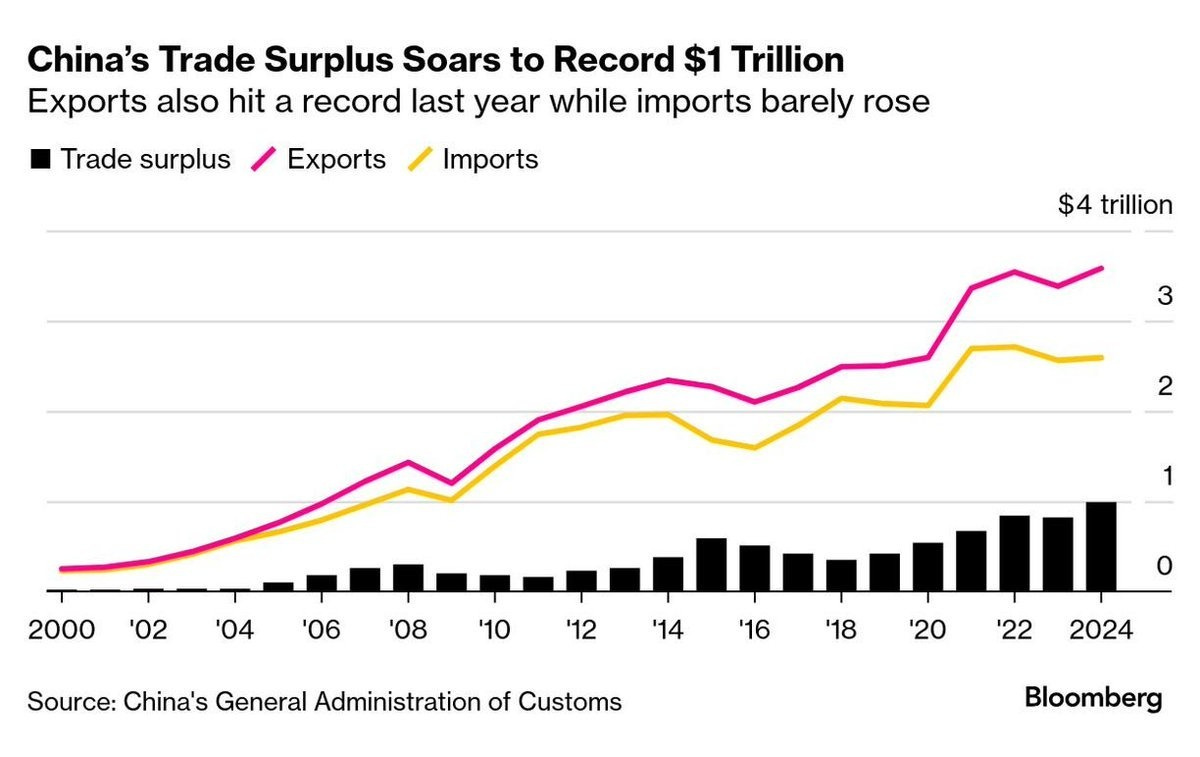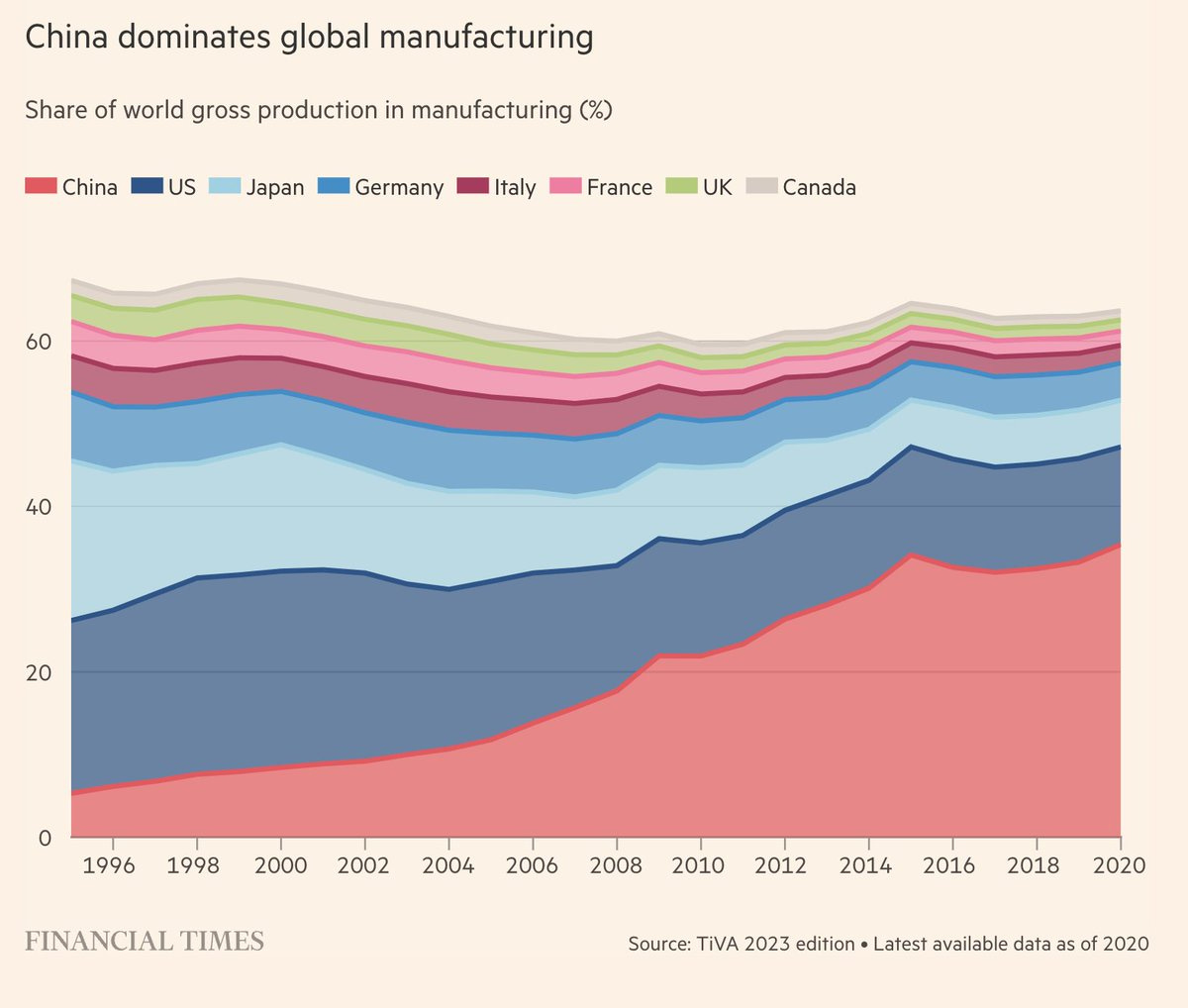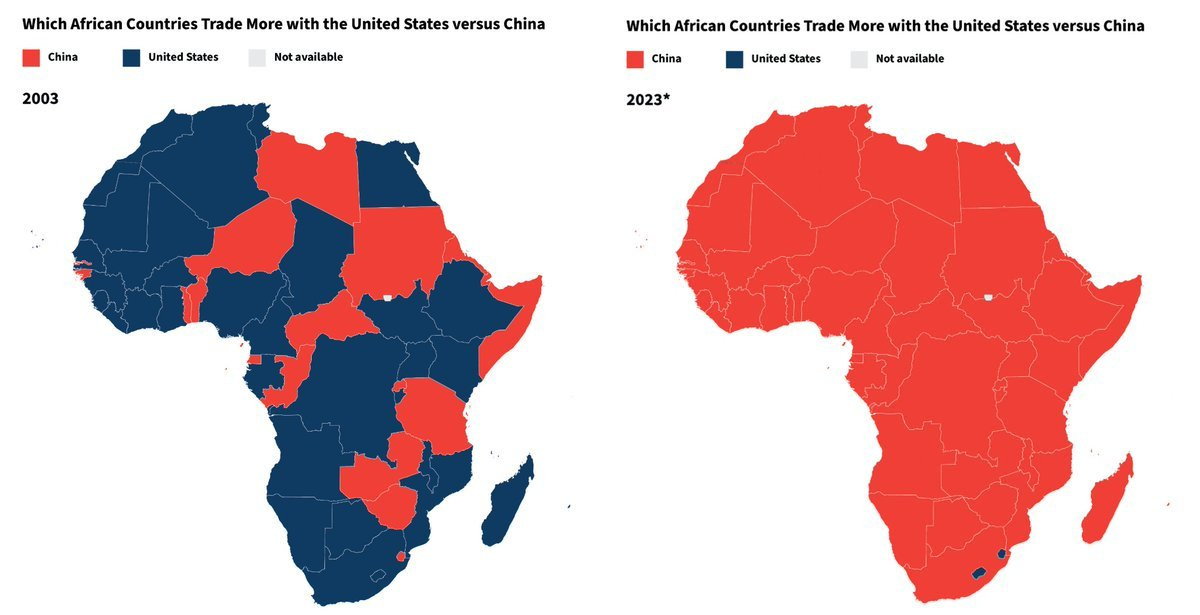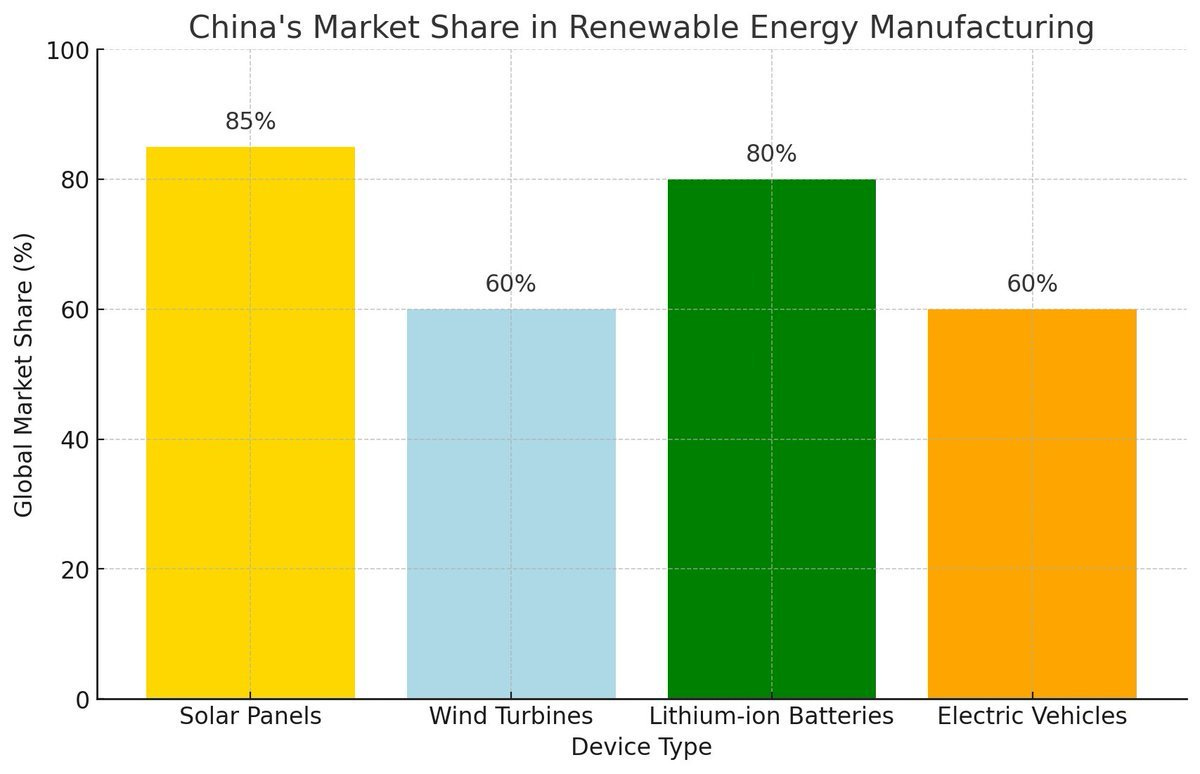风萧萧_Frank
以文会友拥抱中国经济崛起
https://www.theglobalcurrents.com/p/embracing-chinas-economic-rise
Jostein Hauge 2025年4月30日 政治经济学家兼剑桥大学教授 jlh202@cam.ac.uk
尽管存在一些危言耸听的言论,但世界仍将从中国的经济增长中受益。
<<<<<<<<<<<<<<>>>>>>>>>>>>
Jostein Hauge 博士是一位政治经济学家,也是剑桥大学发展研究助理教授,在发展研究中心和政治与国际研究系工作。他还是发展研究哲学硕士项目主任和抹大拉学院的研究员。他的研究领域涵盖国际政治经济学和发展经济学的交叉领域。他是《工厂的未来:大趋势如何改变工业化》(由牛津大学出版社出版)一书的作者。本书探讨了近期技术发展、全球化新力量以及生态崩溃威胁如何塑造工业化路径,并规划了产业政策和全球治理的新路径。
乔斯坦近期的研究成果发表于各类学术期刊,包括《非洲事务》、《发展政策评论》、《地理论坛》、《新政治经济学》、《第三世界季刊》和《世界经济》。除了学术研究之外,乔斯坦还与各国政府和国际组织合作,并与联合国非洲经济委员会、联合国工业发展组织、世界经济论坛以及英国商业、能源和工业战略部共同撰写报告和文章。他的作品也发表于《卫报》、《经济学人》和彭博社等多家媒体。
在剑桥大学任职之前,乔斯坦曾担任伦敦政治经济学院国际政治经济学研究员。他还曾在剑桥大学科学、技术与创新政策中心担任研究员。他拥有剑桥大学政治与国际研究系博士学位,导师是张夏准 (Ha-Joon Chang)。他拥有伦敦大学亚非学院发展经济学硕士学位,以及挪威科技大学经济学学士学位。
乔斯坦的教学涵盖发展经济学、国际政治经济学以及非洲发展政治经济学。他还教授论文和学位论文写作技巧,指导硕士和博士论文项目,并担任抹大拉学院的教务主任。
<<<<<<<<<<<<<<>>>>>>>>>>>>
正文
中国在世界经济中的崛起可以说是21世纪最重要的经济和政治事件。它正以惊人的速度重塑全球贸易和地缘政治。许多西方国家,尤其是美国,对此感到担忧。唐纳德·特朗普的关税就是最明显的例子。但对中国崛起的敌对反应是错误的。中国的崛起并非对全球稳定的威胁——而是一种我们应该欢迎的发展。
中国崛起成为经济超级巨星的速度之快前所未有。中国在全球贸易中的主导地位支撑了这一崛起:中国最近成为历史上第一个贸易顺差达到1万亿美元的国家。
感谢阅读“全球潮流”!免费订阅以接收新文章并支持我的工作。
这种主导地位得益于出口导向型工业化进程。中国几乎在全球所有制造业领域都发挥着重要作用。目前,中国占全球制造业的35%以上,预计到2030年将增至45%。
图片来源:Joe Leahy、Tina Hu、Chan Ho-him,《金融时报》
中国在全球贸易和全球制造业中的主导地位,已引起一些国家的警惕,尤其是美国,美国日益将中国视为经济威胁和竞争对手。目前,美国对华敌视立场几乎已达成两党共识。自2018年以来,共和党和民主党政府都针对中国实施了严格的贸易限制措施,例如出口限制和关税。
当然,人们有理由担心中国在全球贸易和制造业中的主导地位。如果中国在这些领域的主导地位持续增长,那么世界其他国家将无法瓜分到足够的“蛋糕”。除美国外,许多国家都对其与中国竞争的能力表示担忧,其中包括德国、日本、韩国、智利、土耳其和印度等。然而,我们应该记住,中国本身并没有侵蚀这些国家的制造业能力,也没有阻止这些国家制造业能力的发展。这是一个复杂的过程。
已发布的图景。
就中国正在构建的对外关系而言,情况也十分复杂。陈凯尔认为,中国在海外实施了多种“产业外交”战略。在一些国家,例如巴西、印度尼西亚和墨西哥,中国正在加大制造业投资。但在其他国家,尤其是印度,中国正在限制工人和设备的流动。
中国在世界经济中的崛起显然有利有弊。但我认为,利大于弊。
西方国家从中国的崛起中获益
中国在20世纪90年代和21世纪初开始成为全球经济的重要参与者,并以2001年加入世界贸易组织为标志。这受到了大多数西方国家的欢迎。对于西方的消费者和企业而言,中国融入世界经济意味着能够获得价格低得多的制成品,以及更多样化的制成品,包括投入品和制成品。
有一个国家尤其受益于中国提供的高效低成本生产体系:美国。威廉·米尔伯格和黛博拉·温克勒的研究表明,从20世纪80年代到2010年代初,美国进口制成品的价格相对于美国非贸易部门的消费者价格大幅下降,有些甚至下降了40%以上。
美国企业是中国融入世界经济的最大受益者之一。人们普遍误以为中国企业正在超越美国企业。虽然在某些领域确实如此——而且这种现象正在日益增多——但中国的资本主义崛起实际上在某些方面增强了美国的结构性实力,尤其是通过为美国企业创造更多利润。肖恩·斯塔尔斯的研究发现,在全球大多数行业仍然由美国企业主导,这得益于中国的崛起。斯塔尔斯强调,对华投资和从中国进口的投入品使美国企业得以保持其全球主导地位。
电子巨头苹果就是一个很好的例子。苹果在中国市场赚得盆满钵满:过去10年,其营业利润高达2270亿美元,占其同期营业利润的四分之一以上。
美国科技巨头对中国商品的依赖近来备受关注。美国总统唐纳德·特朗普于2025年4月宣布对中国进口产品征收高额关税,美国科技行业的CEO们对此感到愤怒,公司股价应声暴跌。但这些CEO们迅速游说特朗普,并成功促使他降低对中国制造电子产品的关税。苹果、英伟达和微软等大型科技公司都完全依赖这些产品。尽管许多公司计划减少对中国生产体系的依赖,但目前这对它们来说根本无利可图。苹果的供应链就是一个很好的例子。目前,苹果使用的187家供应商中,有157家在中国设有分支机构。
人们普遍认为,中国从与美国企业建立的经济关系中获益——既通过吸引投资,也通过向美国企业提供投入。中国确实巧妙地利用了与苹果等公司的关系,以增强技术能力。但我们很难说中国得到了公平的待遇。例如,在整个2010年代,组装iPhone的中国工人和公司获得的分成不到最终零售价的1.5%。中国工人在服务于美国市场的工厂里辛苦劳作,几乎只为几分钱。
中国崛起为全球南方国家提供新的(可能也是更好的)伙伴关系
中国致力于加强与世界各地的经济关系。对于全球南方国家来说,这是一个加强与超级大国联系的机会,因为这两个国家面临着共同的挑战:试图摆脱经济边缘地位。从这个意义上说,中国为现有的南北关系提供了一个备受欢迎的替代方案。现有的南北关系往往(现在仍然如此)以北方设计的帝国主义安排为特征,旨在从南方攫取利润和资源。虽然中国或许并非全球南方国家经济发展的灵丹妙药——我们也需要认识到中国在全球南方国家采取的多元化战略——但中国要打破西方国家在发展中国家(尤其是在拉丁美洲和非洲)的糟糕参与记录并非难事。
我们应该特别关注非洲,中国加强了与非洲的经济和政治关系。目前,中国已成为几乎所有非洲国家最重要的贸易伙伴。这与21世纪初非洲国家与美国等西方伙伴的贸易往来更为频繁的情况形成了鲜明对比。
图片 来源:卡内基国际和平基金会,扎伊纳布·乌斯曼
中国在非洲已广受欢迎。在撒哈拉以南地区
在非洲,近300项针对该地区的调查显示,对中国的正面评价与负面评价的比例约为3比1。中国也为非洲的经济发展做出了贡献。一项对100多篇文章的回顾发现,在非洲的中国企业对经济发展、能力建设和创新产生了积极影响。
来源:亚洲协会政策研究所
这并不意味着中国对非洲的经济影响一定是绝对积极的。但这种观点往往过于偏向另一个方向,不加批判地强化了关于中国在非洲崛起的负面说法——这些说法往往缺乏真实证据。揭穿这些说法至关重要。关于中国在非洲推行“债务陷阱外交”的说法就是一个很好的例子。这指的是中国通过向非洲国家提供大量贷款,使它们陷入债务陷阱的一种策略。事实证明,这种说法完全是无稽之谈。一项调查了1000多笔非洲贷款的研究发现,中国贷款机构从未扣押过资产,从未通过法院强制执行还款,也从未征收过罚息。
中国是气候卫士
中国对气候的影响备受争议。一方面,中国的工业化进程导致温室气体排放大幅增长。另一方面,中国已成为可再生能源技术开发领域的全球领导者。我认为,后者的收益大于前者的成本。
深入研究中国排放量增长的细节,才能全面了解其背景。如果我们考察基于消费的排放量(这至关重要,因为我们不仅要考虑产品的生产地点,还要考虑消费地点),那么按人均计算,中国远不及其他一些主要国家(尤其是美国)那么糟糕。下图展示了这一情况,它甚至没有考虑各国的历史排放量。如果考虑这些国家的历史排放量,那么大多数西方国家的排放量都会远低于中国。因此,尽管中国肯定能够努力减少排放,但责任主要在于西方。
图片 来源:Our World in Data
中国排放量的增长很大程度上可以归因于快速的工业化进程。在这方面,值得注意的是,中国利用其工业化进程和产能的提升,大规模扩大了可再生能源设备的生产规模。截至2024年,中国占据了全球各类可再生能源设备市场份额的60%至85%,包括太阳能电池板、风力涡轮机、锂离子电池和电动汽车的生产。这不仅有助于中国减缓排放增长,也有助于其他国家通过向其出口这些产品来效仿。
图片 来源:Jostein Hauge(作者),各种在线资源
对中国有利的,就是对世界很大一部分有利
我想在本文最后强调一个在关于中国崛起的辩论中经常被忽视的观点:如果中国做了一件有利于其大多数人口的事情,那么从定义上讲,这也惠及了世界很大一部分人。为什么呢?因为中国约占世界人口的17%。根据世界银行的数据,自1980年以来,中国脱贫的人数超过了世界其他地区脱贫的人数。这是中国取得的非凡成就,任何关心国际发展的人士都应该为此感到高兴。
我们看到,中国的经济崛起虽然并非没有挑战,但也带来了不可否认的好处。然而,危言耸听的反华言论不幸地掩盖了中国融入世界经济的积极方面。当世界很快对中国的崛起产生怀疑时,是时候改变说法了。
Embracing China's economic rise
https://www.theglobalcurrents.com/p/embracing-chinas-economic-rise
 JOSTEIN HAUGE APR 30, 2025 Political economist and Professor,University of Cambridge jlh202@cam.ac.uk
JOSTEIN HAUGE APR 30, 2025 Political economist and Professor,University of Cambridge jlh202@cam.ac.uk
Dr Jostein Hauge is a political economist and an Assistant Professor in Development Studies at the University of Cambridge, based at the Centre of Development Studies and the Department of Politics and International Studies. He is also the Director of the MPhil in Development Studies and a Fellow of Magdalene College. His research lies at the intersection of international political economy and development economics. He is the author of The Future of the Factory: How Megatrends are Changing Industrialization, published by Oxford University Press. The book investigates how industrialization pathways are shaped by recent technological developments, new forces of globalization, and the threat of ecological collapse. It also charts new pathways for industrial policy and global governance.
Jostein’s recent research has been published in various academic journals, including African Affairs, Development Policy Review, Geoforum, New Political Economy, Third World Quarterly, and World Economy. In addition to his academic research, Jostein works with governments and international organisations, and has co-authored reports and articles for the UN Economic Commission for Africa, the UN Industrial Development Organisation, the World Economic Forum, and the UK Department for Business, Energy, and Industrial Strategy. His work has also appeared in various media outlets, such as The Guardian, The Economist, and Bloomberg.
Prior to his current post at the University of Cambridge, Jostein was an LSE Fellow in International Political Economy at the London School of Economics and Political Science. He has also worked as a Research Associate at the Centre for Science, Technology and Innovation Policy at the University of Cambridge. He has a PhD degree from the Department of Politics and International Studies at the University of Cambridge, where he was supervised by Ha-Joon Chang. He obtained his Master’s degree in Development Economics from the University of London's School of Oriental and African Studies, and his Bachelor’s degree in Economics from the Norwegian University of Science and Technology.
Jostein’s teaching covers development economics, international political economy, and political economy of development in Africa. He also teaches skills for essay - and dissertation writing, supervises MPhil and PhD dissertation projects, and is a Director of Studies at Magdalene College.
Thanks for reading Global Currents! Subscribe for free to receive new posts and support my work.
This dominance has been made possible by an export-led industrialisation push. China plays a part in practically all global manufacturing industries. It now accounts for more than 35% of global manufacturing, a number which is expected to increase to 45% by 2030.
 Source: Joe Leahy, Tina Hu, Chan Ho-him, Financial Times
Source: Joe Leahy, Tina Hu, Chan Ho-him, Financial Times
China’s dominance in global trade and global manufacturing have raised alarm bells in some countries, particularly the US, which increasingly views China as an economic threat and competitor. The hostile stance towards China has practically reached bipartisan consensus in the US now. Since 2018, both Republican and Democratic administrations have implemented strict trade restrictions aimed at China, such as export restrictions and tariffs.
There are of course legitimate reasons to worry about China’s dominance in global trade and manufacturing. If China’s dominance in these areas keeps growing, there will simply not be enough of the ‘pie’ to share between the rest of the world. Beyond the US, many countries have expressed concerns about their ability to compete with China, including Germany, Japan, South Korea, Chile, Turkey and India, to name a few. However, we should keep in mind that China has not by itself eroded manufacturing capabilities in these countries or prevented manufacturing capabilities in these countries from developing. It’s a complicated picture.
With respect to the ties that China is building abroad, the picture is also complicated. Kyle Chan argues that China has diverse strategies of ‘industrial diplomacy’ abroad. In some countries, such as Brazil, Indonesia, and Mexico, China is ramping up manufacturing investment. But in other countries, most notably India, China is limiting the flow of workers and equipment.
China’s rise in the world economy clearly comes with benefits and drawbacks. But I’d argue that the benefits outweigh the drawbacks.
The West has profited from China’s rise
China started becoming a big player in the global economy in the 1990s and 2000s, marked by membership in the World Trade Organization in 2001. This was welcomed by most countries in the West. For consumers and corporations in the West, China’s integration into the world economy meant access to vastly cheaper manufactured goods and access to a larger variety of manufactured goods, both as inputs and finished goods.
One country in particular took advantage of the efficient and low-cost production systems that China offered: the US. William Milberg and Deborah Winkler have documented that the price of manufactured goods imports into the US have declined massively relative to US consumer prices in non-traded sectors between the 1980s and early 2010s, in some instances by more than 40%.
US corporations are among the greatest beneficiaries of China’s integration into the world economy. There is a common misconception that Chinese firms are outcompeting US firms. While this is true in some sectors — and is increasingly happening —, the capitalist rise of China has actually boosted US structural power in certain ways, especially by generating more profits for US corporations. Research by Sean Starrs finds that most global industries are still dominated by US corporations, aided by China’s rise. Starrs highlights that both investments in China and imports of inputs from China have enabled US corporations to maintain their global dominance.
The electronics giant, Apple, is the perfect case in point. Apple has made a fortune in China: $227 billion in operating profit over the past 10 years, which accounts for over a quarter of its operating profit during this period.
 US tech giants’ dependency on Chinese goods was in the spotlight recently. When US president Donald Trump announced steep tariffs on Chinese imports in April 2025, CEOs in the US tech industry were outraged as the share prices of their companies plummeted. But these CEOs rapidly and successfully lobbied Trump to quickly lower tariffs on Chinese-made electronics items, which big tech firms, such as Apple, Nvidia and Microsoft, are completely dependent on. Although many of these corporations have plans to become less dependent on China’s production systems, it’s simply not economically profitable for them at this point. Apple’s supply chain is a good case in point. 157 of the 187 suppliers used by Apple currently have a presence in China.
US tech giants’ dependency on Chinese goods was in the spotlight recently. When US president Donald Trump announced steep tariffs on Chinese imports in April 2025, CEOs in the US tech industry were outraged as the share prices of their companies plummeted. But these CEOs rapidly and successfully lobbied Trump to quickly lower tariffs on Chinese-made electronics items, which big tech firms, such as Apple, Nvidia and Microsoft, are completely dependent on. Although many of these corporations have plans to become less dependent on China’s production systems, it’s simply not economically profitable for them at this point. Apple’s supply chain is a good case in point. 157 of the 187 suppliers used by Apple currently have a presence in China.
It’s commonly argued that China has benefitted from the economic relationships forged with US corporations — both through attracting investments and through supplying US corporations with inputs. China has indeed utilised relationships with companies such as Apple in clever ways in order to build up technological capabilities. But we can hardly claim that China has gotten a fair deal. For example, throughout the 2010s, Chinese workers and firms that assembled the iPhone got less than 1.5% of the final retail price. Chinese workers have literally toiled for pennies in factories serving US markets.
China’s rise offers new (and potentially better) partnerships for the Global South
China has made a committed effort to strengthen economic relationships across the world. For countries in the Global South, this is an opportunity to strengthen ties with a superpower that shares a common challenge: trying to emerge from the economic periphery. In this sense, China provides a welcome alternative to existing North-South relationships, which have often been (and often still are) characterised by imperial arrangements designed by the North to extract profits and resources from the South. While China may not be a magic bullet for economic development in the Global South at large — and while we need to recognise China’s diverse strategies in the Global South —, it would not take much for China beat the poor track record of Western involvement in developing countries, especially in Latin America and Africa.
We should pay particular attention to Africa, where China has strengthened both economic and political relationships. By now, China is the most important trading partner for almost all African countries. This stands in stark contrast to the situation in the early 2000s, when African countries traded more with Western partners, such as the US.
 Source: Zainab Usman, Carnegie Endowment for International Peace
Source: Zainab Usman, Carnegie Endowment for International Peace
China has become highly popular in Africa. In Sub-Saharan Africa, positive views of China outweigh negative views by a factor of about 3 to 1 across nearly 300 surveys in the region. China is also contributing to economic development in Africa. A review of over 100 articles found that Chinese firms in Africa have a positive impact on economic development, capacity building, and innovation.
 Source: Asia Society Policy Institute
Source: Asia Society Policy Institute
This does not mean that China’s economic impact in Africa is unambiguously positive. But the pendulum tends to swing too much in the other direction, uncritically reinforcing negative narratives about China's rise in Africa — often with little to no grounding in real evidence. It’s important to debunk such narratives. The narrative about China's "debt-trap diplomacy" in Africa is a good example. This refers to a perceived strategy whereby China provides substantial loans to African nations as a way to trap them into debt. This narrative has turned out to be nonsense. A study that looked at more than 1,000 loans to Africa found that Chinese lenders never seized assets, never used courts to enforce payments, and never applied penalty interest rates.
China is a climate champion
China’s impact on the climate is heavily debated. On the one hand, China’s industrialisation has entailed considerable growth in greenhouse gas emissions. On the other hand, China has become a global leader in efforts to develop technology for renewable energy. I would argue that the benefits of the latter outweigh the costs of the former.
It’s important to look into the details of China’s growing emissions to understand the full context of them. If we look at consumption-based emissions (which is vital because we want to account for where things are consumed, not only produced), China is not nearly as bad as some other major countries, most notably the US, in per capita terms. The below chart, which depicts this, doesn’t even account for countries’ historical emissions. If it did, most countries in the West would score far worse than China. So, while China can surely work on reducing their emissions, the responsibility to do so primarily lies with the West.
 Source: Our World in Data
Source: Our World in Data
China’s growing emissions can largely be attributed to rapid industrialisation. In this respect, it’s important to note that China has used its industrialisation and increased productive capacity to massively scale up production of renewable energy devices. As of 2024, China accounted for 60-85% of the global market share across a range of renewable energy devices, including the production of solar panels, wind turbines, lithium-ion batteries and electric vehicles. This is not only helping China slow down growth in emissions — it’s also offering other countries to do the same by exporting these products to them.
 Source: Jostein Hauge (author), various online sources
Source: Jostein Hauge (author), various online sources
What’s good for China is good for a big part of the world
I’d like to conclude this post by highlighting a point often overlooked in the debate on China’s rise: if China does something that benefits a majority of their own population, this, by definition, benefits a big part of the world. How? Because China accounts for roughly 17% of the world’s population. According to World Bank data, since 1980, the number of people lifted out of poverty in China exceeds the number of people lifted out of poverty in the rest of the world. This is a remarkable achievement by China, and should be celebrated by anyone who cares about international development.
We see that China’s economic ascent, while not without challenges, has delivered undeniable benefits. The alarmist anti-China rhetoric has unfortunately overshadowed the positive aspects of China’s integration into the world economy. In a world quick to view China’s rise with suspicion, it’s time to shift the narrative.




